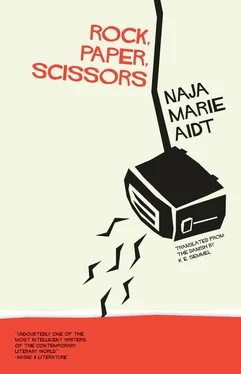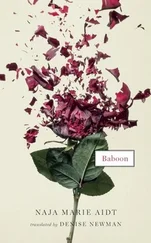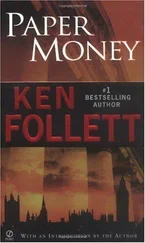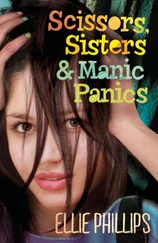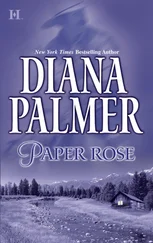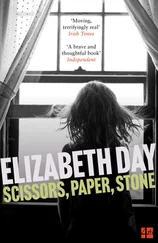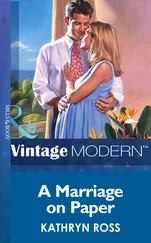Luke drives fast. He doesn’t say a word. Sunlight sweeps over the landscape with inexpressible beauty. At first Thomas wants to say something, compel Luke to tell him about Patricia’s intentions. But he changes his mind; it would be the dumbest thing to talk to Luke about that. It’d be best to seem unaffected, as though nothing were amiss. Because something tells him that Patricia’s the problem, not Luke. So Thomas watches the scattered green fields and gradually feels his body relaxing. He’s tired after the long night, the many poems, the tequila. He closes his eyes, dozes with his chin resting on his chest. When Luke stops the car on the side of the road, he jerks awake.
“What’s going on?”
“Nothing,” Luke says dismissively. He sits with his hands on the wheel and stares ahead. Soon he starts the car again and steers onto the road.
“Don’t you know where you’re going?”
“Yes.”
Thomas observes Luke out of the corner of his eye. The small freckles in his face are light-brown, finely drawn against his olive skin. The lush eyelashes, the delicate marzipan-like curve of his ears. There’s a little dust in his hair, along with some flakes of dried leaves.
“Did you call your mom and tell her we were coming?”
Luke shakes his head. He seems determined. And there’s nothing more to say. They drive for half an hour in silence. On either side of the car are vast fields, pastures with swampy areas, the forested mountainsides far in the distance. They pass a small gas station, a few large farms, some low houses made of wood. It really is a thinly populated region. Thomas forces thoughts of Patricia out of his mind. Then Luke exits the main roadway and drives along a complicated network of side roads, until he suddenly slows, then finally turns down a long, winding driveway. A house comes into view, or rather, a shack. In several places a window has been smashed, replaced with cardboard instead of glass. The roof looks dangerously warped. It’s a wooden house painted red, but the paint’s chipped and the foundation is covered in green lichen. At one end of the house, a loose board juts out, revealing the rotting core. An old moped lies flipped on its side on the lawn, along with a wheel-less wheelbarrow and something that resembles a stack of rusted iron, which turns out to be some bedframes and various broken farm implements. Luke parks the car. But he doesn’t get out. He lets out a deep sigh.
“You think anyone’s home?” Thomas asks cautiously. Luke shrugs. “Come,” he says, opening the car door. “Maybe she’s inside.” Standing in front of the house is a simple wooden table, a bench, and a ramshackle garden chair with cushions made of a pale-yellow material, which at one time had been patterned with something like orange tulips. Beer bottles are scattered around the yard. A bucket with rainwater and cigarette butts. A broom, a shovel, a ruined fruit-picker leaning up against the doorframe. Luke leaves the car door open, strides through the tall grass, and grabs the doorknob. It’s locked. Thomas walks up beside him. They peer through the windows. The kitchen’s a dreadful mess. With the outdated electric stove and a big dirty pot on the kitchen table, it looks awfully sad in there: dirty dishes; a loaf of sliced white-bread, the bag opened; a package of margarine — also opened; a hunk of half-buttered bread; and a large knife beside it smeared with margarine. As if someone was interrupted while preparing breakfast. Old newspapers litter the floor. They walk around the outside of the house. Blankets are heaped on the unmade bed in the bedroom, the living room is dominated by a large TV and a battered couch — on which a pair of curled up cats are sleeping comfortably together. Another room apparently serves as a kind of storage space. Here, various pieces of furniture are piled one atop the other, along with cardboard boxes and plastic bags scattered pell-mell, spider webs, junk upon junk. Topping the stack is a child’s broken highchair. “Why would they have a highchair?” Thomas asks. “Do you have younger siblings? Or is your mother a grandmother?”
“It’s mine,” Luke says, pulling himself away from the window, into the sunlight. “From when I was small. I don’t know why she brought it up here.”
They sit on a bench smoking cigarettes. Thomas doesn’t dare say anything about the place; he’s not sure how Luke will respond if he says anything negative. And it’s hard to formulate anything positive. He feels bad for the kid; did he really grow up in such a dump? Or were things better when Rose still lived in the city? He can’t bring himself to ask. Luke closes his eyes and takes a deep drag on his cigarette.
“Does your mother live alone here?” Thomas asks. “No idea,” Luke says. “I haven’t seen her for a long time. Let’s go.” He stands and begins strolling slowly, as though despondent, sluggish, toward the car. Thomas flicks his cigarette butt into a bucket and follows him. Just as they click on their seatbelts, a small van comes into view on the winding gravel drive. Luke’s hands grip the wheel. His knuckles are white. The van approaches, jouncing and spitting exhaust fumes. Now they can see two people in the front seat. One must be Rose, but even when the van passes right next to them, Thomas can’t recognize her at all. Luke doesn’t move a muscle. The van comes to a halt, and a man climbs out with difficulty. He’s compact and heavy and wearing a thick, quilted vest over a brown sweater, though the temperature is well above 70 degrees. Clipped to his belt is a large ring of keys. His shoes are tattered, his face puffy. He wanders slowly around the van and opens the door for Rose. A pair of long, thin legs poke from the car now. And then the rest of Rose appears. She’s a tall woman, just as Thomas remembers her, but now she’s emaciated and frail. She’s wearing leggings and an oversized, floppy shirt that’s a nondescript bluish-green. At the center of her shirt is the washed-out print of a pink apple. Her hair, once shiny and reddish-orange, now tumbles around her face like a pallid nimbus, discolored and dry. For a moment she stands silently, as if finding her balance. Then she turns toward Luke’s car, still wearing her sunglasses. “Honey,” she says in a strangely slurred voice, “is that you?” Finally a kind of life stirs in Luke. He glances quickly and expressionlessly at Thomas, then climbs out of the car. Thomas frees himself from his seatbelt and follows him. They stand under the baking sun, and Luke shoves his hands into his pockets. The man says, “So you’re Luc.” And Luke’s mother comes clattering — that’s how it seems — clattering on her long, delicate bones, the flesh still somehow clinging to them, clattering into a clumsy embrace of her son, who looks as though he doesn’t know what to do with himself. “My child,” she mumbles. “My boy.” Then she lets go of him. “Why don’t you ever visit your mother?” The man, meanwhile, begins carrying plastic bags into the house. They must have gone grocery shopping. Rose removes her sunglasses, revealing her face. It’s easy to see the similarity between her and Luke: the caramel-colored eyes, the freckles. But her mouth is narrow and pinched sourly, trembling now. Behind it a row of small, yellowed teeth. She finds her cigarettes and a lighter. She coughs, spits in the grass, then slowly lifts a cigarette to her lips. Her upper body sways a little. Either she’s drunk or on something. Pills, maybe, something deadening. Every now and then her eyes glide shut, and she tips so far backward that it seems she’ll fall over. But each time she manages to right herself at the last instant.
“Mom,” Luke says. “Mom. Why are you high already? This early in the afternoon for God’s sake. Who’s giving you the pills?”
Читать дальше
